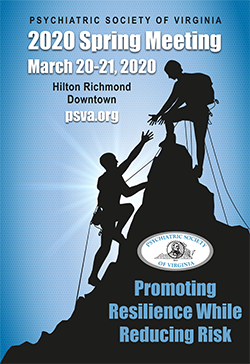Winter 2019 Issue |
|
APA Assembly Meeting Update
By John P. Shemo, MD, DLFAPA
At this meeting, the current Speaker of the Assembly, along with the Assembly Executive Committee, decided to introduce and pilot a somewhat different approach to how action papers and position statements are passed. The position statements are typically produced by APA committees with appointed members who may well not be in the Assembly. Action papers are authored by an Assembly member as first author, but it may be co-authored by APA members who are not in the Assembly. At the Assembly meeting, the position statements are typically sent to either two or all area councils to review in their area meetings, while the action papers typically go to one of five Reference Committees consisting of members from all seven areas as well as representatives from other groups, such as the members in training and early career Psychiatrists. The initial presentation of the assigned action papers in a reference committee can be attended by any Assembly member interested in a given action paper.
Following this, these items will be presented on the floor of the Assembly for discussion/debate and then to a vote. Some items, such as action papers, can be amended on the floor of the Assembly. Others, including postion statements, may be discussed, but are subject to a yes or no vote as they stand, without the possibility of change from the floor.
Early in the Assembly meeting, there is a presentation of a "consent calendar." This typically contains items that are felt to be non-controversial, so on a single vote, all items on the consent calendar are passed without debate. However, any single member of the Assembly may pull an item, prior to vote, from the consent calendar. It will then be assigned for further review to either Area or Reference Committees and it will be individually discussed and voted on from the floor of the Assembly.
The new procedure essentially has the reference committees, at the start of each reference committee floor report, present to the Assembly, a consent calendar based on those items it reviewed. Again, all items on these secondary consent calendars are voted on and passed collectively unless any Assembly member asks that it be removed from the calendar.
Another change made is that the deliberations and votes of the Reference Committees can no longer be attended by any interested Assembly member. Assembly members may to to the initial part of the Reference Committee meeting where the papers are presented. Any member may go to the initial part of the Reference Committee meeting where the papers are presented. Any member may rise to discuss, but they may not be witnesses to the Reference Committee's deliberations and votes. While non-committee members even in the past, could not speak during the Reference Committee deliberations and votes, unless the committee asked for input or clarification, they could at least attemd. The complete exclusion of non-committee members was based on the stated concern that the Reference Committee members could be potentially influenced in their vote by the presence of the paper's author.
Part of the reasoning for these changes was the concern that a lot of "word-smithing" occurred during floor deliberations and it was time consuming. While I certainly agree with this observation, I tend to have a bias that words are critically important and that "devil is in the deils."
Over the past years, I have seen action papers vastly improve by being "picked apart" by the Assembly. The Assembly is comprised of a very diverse group of over 200 psychiatrists from every state, elected by their peers, either geographically or by subspecialty, at very different stages of their careers, with tremendously diverse practice setting and clinical experience, and many with vast research, administrative and publishing credentials.
I hope that too much is not lost with this procedural change in the service of efficiency. The challenge for Assembly members with a commitment to careful deliberation of actions of the Assembly, which includes most members, is that items that can go on the expanded consent calendar are being decided in five Reference Committees or seven Area Council meetings, each group occuring at the same time. Getting accurate and comprehensive feedback from all of these sources prior to voting will be a challenge as they will not be occurring before your eyes.
Postition Statements approved include:
- Assuring the appropriate care of pregnant and newly-delivered women with substance abuse disorders
- Discriminatory disability insurance coverage
- Leadership of state behavioral health services
- Addressing racial and ethnic health disparities in substance abuse disorder treatment in the justice system
- Diversity and inclusion in the physician work force
- Racism in the psychiatric work place
- Discrimination against persons with previous psychiatric treatment
- Psychiatric participation in interogation of detainees
- The need to monitor and access the public health and safety consequences of legalizing mariquana
Other actions:
- The Assembly voted to approve the "Practice Guidelines for the Treatment of Patients with Schizophrenia."
- The Assembly voted to approve changes to DSM-5 regarding:
- Avoidant/restrictive food intake disorer
- Reinstatement of unspecified mood disorder
- Narcolepsy subtypes
- Substance/medication-induced disorders
Action papers:
- The Assembly voted to approve an action paper which asks APA to join as a signatory to tehe U.S. "call to action" on climate, health and equity.
- The Assembly voted to ask that APA form a work group to examine laws concerning emergence holds and create a resource document outlining their findings.
- The Assembly voted to ask APA to address workplace intimidation and bullying at the Veteran's Administration.
- The Assembly voted to ask APA to refrain from making available a category of voting or non-voting affiliate members that would be open to any non-physician. (The concern being that such affiliate members could then use this status to further scope of practice litigation.
Again as noted above, this is a brief summary of four days of very long meetings. Adam, Varun and I are always available to further discuss issues related to actions of the Assembly or the APA. We are also very open to discuss the concerns of PSV members that can be address through action papers.
YOUR NEWSLETTER IS NOW AVAILABLE ON YOUR SMARTPHONE AND TABLET!
JOIN PSV TODAY!
PLAN NOW!
PSV 2019
SPRING MEETING
March 20-21, 2020
Hilton Richmond Downtown
APA Find a Psychiatrist
Are you accepting new patients?
Opt into APA’s “Find A Psychiatrist” database. To view the functionality or opt-in,
CLICK HERE
FYI: A link for this option has been added to the PSV website. Select the “About” button and then “Find a Psychiatrist” from the drop down.





